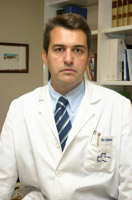

Rectal cancer is a disease in which cancerous (malignant) cells are found in the tissues of the rectum.
The rectum is part of the digestive system. The digestive system extracts and processes nutrients (such as vitamins, minerals, carbohydrates, fats, proteins, and water) from food and stores waste until it is expelled from the body.
The digestive system consists of the esophagus, stomach, and small and large intestines. The last 6 feet of intestine are called the large intestine or colon, while the last 6 inches make up the rectum and anal canal. The anal canal ends in the anus (opening of the rectum to the outside of the body).
Age and family history can affect the risk of developing rectal cancer. The following are possible risk factors for rectal cancer:
- Be 50 years of age or older
- Family history of colon or rectal cancer
- Personal history of colon, rectum, ovarian, endometrial, or breast cancer
- History of ulcerative colitis (ulcers in the lining of the large intestine
- Certain inherited conditions, such as familial adenomatous polyposis and hereditary nonpolyposis colon cancer (HNPCC; Lynch syndrome)
- What are the signs of rectal cancer?
Possible signs of rectal cancer include changes in bowel habits or blood in the stool. These and other symptoms can be caused by cancer of the rectum or other diseases. If any of the following problems occur, you should consult your doctor:
- Change in bowel habits.
- Blood in the stool (either very bright red or very dark).
- Diarrhea, constipation, or feeling that the bowel is not completely cleansed. • Thinner than normal stools.
- Abdominal discomfort in general (frequent pain caused by gas, bloating, spasms, or cramps).
- Weight loss for no apparent reason.
- Permanent tiredness.
- Vomit
- Colon and rectal exams
Rectal and colon exams are used to help detect (find) and diagnose cancer of the rectum. Tests used to diagnose rectal cancer include:
- Fecal occult blood test: This test examines the patient's stool (stool) for occult blood. A small stool sample is placed on a special card and taken to the doctor or laboratory.
- Digital rectal exam: The doctor or nurse, wearing gloves, inserts a lubricated finger into the rectum and gently tries to look for abnormal masses and examines the stool for any signs of blood.
- Barium enema: A procedure in which a liquid containing barium is introduced into the rectum, this is carried out through the anus. Barium is a silver-white metallic compound that helps show the image of the lower gastrointestinal tract on the X-ray.
- Sigmoidoscopy: A test in which the doctor uses a sigmoidoscope (a thin, lighted tube) to see inside the rectum for polyps, tumors, or abnormal sections. If during the exam, the doctor sees a polyp or other abnormal tissue, he or she may remove it and then examine it under a microscope.
- Colonoscopy: An examination of the inside of the colon and rectum with a special instrument called a colonoscope (a thin, lighted tube) inserted into the rectum. If during the exam, the doctor sees a polyp or other abnormal tissue and may remove it and then examine it under a microscope.
- Biopsy: Removal of cells or tissue to be analyzed under a microscope. When only a sample of tissue is removed, the procedure is called incision biopsy or central biopsy. When the entire tumor or lesion is removed, the procedure is called a biopsy. When a sample of tissue or fluid is removed with a needle, the procedure is called needle biopsy or fine needle aspiration.
Certain factors affect treatment options and prognosis (chance of recovery). Treatment options and prognosis depend on the stage of the cancer (whether it has affected the inner lining of the rectum only, whether it has affected the entire rectum, or has spread to other parts of the body), the type of cancer, the size of the tumor, and the overall health of the patient.
- What tests are available to determine the stage of rectal cancer?
Once rectal cancer is diagnosed, additional tests will be done to find out if cancer cells have spread to other parts of the body. The process used to find out if cancer has spread within the rectum or to other parts of the body is called staging. The stage of the disease is determined by information gathered from the stage process. It is important to know the stage of the disease in order to plan the appropriate treatment. The following tests and procedures may be used in the staging process:
- Digital rectal exam: The doctor or nurse, wearing gloves, inserts a lubricated finger into the rectum and gently tries to look for abnormal masses and examines the stool for any signs of blood.
- TAC: CT is a procedure that takes a series of pictures of areas inside the body, taken from different angles. This is also known as computed tomography, computed tomography, or computerized axial tomography.
- MRI (Magnetic Resonance Imaging): A procedure in which a magnet connected to a computer is used to create detailed photographs of areas inside the body. Also known as nuclear magnetic resonance imaging, MRI (NMRI).
- Sigmoidoscopy or colonoscopy and biopsy: A sigmoidoscope or colonoscope (a thin, lighted tube) is used to examine the inside of the rectum. If abnormal tissue is found during the exam, a small piece of tissue is cut out for examination under a microscope to see if cancer cells are present.
- Endoscopic ultrasound (EUS): An endoscope (a thin tube used to examine tissues inside the body) is used to bounce high-energy sound waves off internal tissues and organs to change the resonance in photographs called sonograms. This procedure is also known as echoendoscopy. Endoscopic ultrasound can be used to create photographs of the inside of the rectum.
- What are the stages of rectal cancer?
The following stages are used to classify cancer of the rectum:
Stage 0 (carcinoma in situ)
Stage 0 rectal cancer is found only in the upper lining of the rectum. Stage 0 cancer is also known as carcinoma in situ.Stage I
Cancer has spread beyond the upper lining of the rectum to the second and third layers and includes the inner wall of the rectum, but has not spread to the outer wall of the rectum or outside the rectum. Stage I rectal cancer is also known as Dukes A rectal cancer.Stage II
Cancer has spread outside the rectum to surrounding tissues, but has not spread to the lymph nodes. (Lymph nodes are small, bean-shaped structures found throughout the body whose function is to produce and store infection-fighting cells.) Stage II rectal cancer is also known as Dukes B rectal cancer.Stage III
Cancer has spread to surrounding lymph nodes but has not spread to other parts of the body. Stage III rectal cancer is also known as Dukes C rectal cancer.Stage IV
Cancer has spread to other parts of the body, such as the liver, lungs, or ovaries. Stage IV rectal cancer is also known as Dukes D rectal cancer. - Recurrent rectal cancer
Recurrent rectal cancer means that the cancer has come back (come back) after it has been treated. It can come back to the rectum or other parts of the body, such as the colon, pelvis, liver, or lungs.
There are different types of treatments for all patients with rectal cancer. Some treatments are considered standard (currently used treatment) and others are in clinical study. Before starting treatment, patients should consider participating in a clinical trial. Treatment in a clinical trial is a research study that helps improve current treatments or learn about new treatments for cancer patients. When a clinical trial shows that a new treatment is better than the treatment used as standard, the new treatment may become the standard treatment.
- What are the treatment options for rectal cancer?
Stage 0
Treatment may include:
- Local excision (surgery to remove the tumor without cutting the abdomen) or simple polypectomy (surgery to remove a growth protruding from the mucous membrane of the rectum).
- Resection: (surgery to remove the cancer). It is done when the cancerous tissue is too large to be removed by local excision.)
- Internal or external radiotherapy
Stage I
Treatment may include:
- Surgery to remove the tumor with or without anastomosis (joining the cut tips of the rectum).
- Surgery to remove the tumor with or without radiation therapy and chemotherapy.
- Internal or external radiotherapy
Stage II
Treatment may include:
- Resection with or without anastomosis (joining of the cut tips of the rectum and colon or colon and anus) followed by radiation therapy and chemotherapy.
- Total or partial pelvic rashing (surgery to remove organs and structures around the pelvis), depending on where the cancer has spread.
- Surgery followed by radiation therapy and chemotherapy.
- Radiation therapy with or without chemotherapy, followed by surgery and chemotherapy
- Radiation therapy given during surgery followed by external beam radiation therapy and chemotherapy.
- A clinical trial evaluating new treatment options.
Stage III
Treatment may include:
- Resection with or without anastomosis (joining of the cut tips of the rectum and colon or colon and anus) followed by radiation therapy and chemotherapy.
- Full or partial pelvic exaggeration (surgery to remove organs and structures around the pelvis), depending on where the cancer has spread.
- Surgery followed by radiation therapy and chemotherapy.
- Radiation therapy with or without chemotherapy, followed by surgery and chemotherapy.
- Radiation therapy given during surgery followed by external beam radiation therapy and chemotherapy.
- Chemotherapy and radiation therapy to relieve symptoms caused by advanced cancer.
- A clinical trial evaluating new treatment options.
Stage IV
El tratamiento puede incluir los siguientes:
- Resection, anastomosis, or both (joining the cut tips of the rectum and colon or colon and anus) to relieve symptoms caused by advanced cancer.
- If the tumor has spread only to the liver, lungs, or ovaries, surgery is used to remove the cancer from where it has spread.
- Chemotherapy and radiation therapy to relieve symptoms caused by advanced cancer.
- Chemotherapy after surgery.
- Clinical study where chemotherapy and biotherapy are evaluated.



































